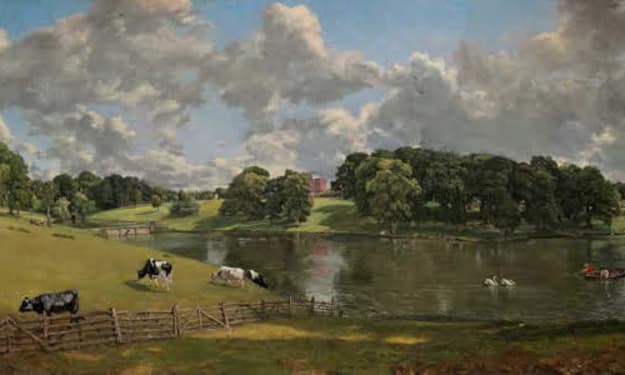
This is the outline of how I border jumped into the United Kingdom. Hypothetical outline—of course. No, I didn't range the jungles of Calais and charter a dinghy across perilous waters. I just came right in. No passport, no form of identification, full on luggage in tow (all worldly possessions). Just straight in from the other end of the world, and not one immigration officer asked me a thing—no police, no check-in. Just me strolling onto this foreign soil like I was Elizabeth Regina herself.
To the heart of it though; I first became an illegal immigrant in the year 2010. Since then I suppose I may be classed as a "professional" illegal immigrant. I’ve done it for so long, and with varying success at different points, it became almost a profession.
It was freezing June in South Africa that year I first became illegal. The year the Republic hosted the World Cup, I was an intern for a prestigious international publishing company with offices in Johannesburg. They had no idea I wasn’t local.
Life calls on us, at some point, to assimilate. I had to learn that sometimes this is the only choice; assimilation or alienation (or rather annihilation). One is at times called on to change with the environs; to "blend in." The issue, though, with being a so-called émigré is how much of your authentic self do you retain? What are you willing to lose in your quest to be accepted? Because, when you’re émigré, to be accepted can simply be to fit in.
And that is what I did. As a 20-year-old in the administrative capital of Pretoria starting off as the only non-local in a journalism class. (Here I say "local" because in South Africa they have a slogan/motto Local is Lekker—loosely translated; Authentically South African is best… so I was the non-local of the bunch).
It was just easier to learn their languages (they have 11 official languages! I learned about 3); easier to absorb their nuances. Then of course came the total lack of differentiation, 'til, finally, I developed that uncanny ability for assimilation, and that stripping of former self and putting on different colours—colours to match the environment—served me time and time again throughout my period in Johannesburg. Like at the publishing house.
They thought I was as local-lekker as they come, so much so that they took me on without even asking for identification. But, obviously, you can’t keep a lid on something like that for long. They soon learned what I really was.
To find your true place in the world is the greatest blessing. By true place I mean where your soul proverbially sings doing what you were meant to do. It was that way for me at the publishing house. I got up every morning with an indescribable joy in my heart knowing that in the day to unfold I would nurture and promote storytelling—what I have always loved.
That publishing house was my dream job. When they dropped me after my sketchy immigration status came to light, I walked out of there onto the bustling, vibrant metropolitan streets feeling thoroughly downtrodden. I wanted the world to stop. Truly speaking, I felt a reject. Not like a reject. I felt an actual reject.
It broke my heart.
I want to slip in a quick story here. A brief description of an evening coming home from a part-time job I later fell into: I was squeezed into the back of a kombi—that truly awful primary mode of transport for the majority of the population of South Africa; small, cramped minivans that have been the death of thousands.
I was sitting jammed into a right hand corner on the back seat. It was sweltering hot. Everyone in that over-crowded contraption was sweating; I was too. I put my head out the window to get some much-needed air when we sopped for our driver to fuel up. That’s when I overheard the conversation that followed between one of the petrol attendants and another guy with a bike parked to one side with some engine trouble.
The petrol attendant had that distinct accent of the average person from my home country. He was helping the guy with the bike, going on about how he was a fully qualified electrical engineer curtesy of university education. He spoke robustly, in an off-hand kind of manner that was almost unfeeling, like he could have been talking about something random.
But there was an underlying thread in his tone. Something resembling poignancy; a ruefulness mingled with a little yearnful remembrance.
I thought of the thousands upon thousands of my countrymen in South Africa. University educated people waiting tables, sitting babies, cleaning houses, attending gardens and petrol stations, like this guy; even menial typists, as I was at the time. Individuals that know they’re skilled and talented with so much more to offer the world but individuals who have sucked it up, rolled up their sleeves and taken whatever their immigration status can get them, because returning "home" would be to go back to even worse degradation and poverty. And my own particular abhorrence; a degradation and poverty inclusive of failure and impotence.
Not long after the doors shut behind me at the publishing house, I paid a guy to pay a guy to pay another guy to get me a fake permit (if you follow). And that is how it began—my eventual descent into all kinds of forgery, falsification, falsehood and, ultimately, me standing at a check-out counter at Schiphol Airport Amsterdam branded a kidnapper and a child trafficker. Hypothetically, of course.
But this is not some brash narrative on the successes and plummets of a life marked by trickery—wheeling and dealing. It’s the honest account of a girl who dreamed impossible dreams, fell in love with fairy tales and then skidded along paths she never thought to traverse.
You ask yourself "Who am I?" constantly as an immigrant. Because if you don’t, as in all life, your definition will be made for you. And it is a truly unhappy thing to lose sight of who you are in foreign soils.
An American President once wrote that he was told by a certain woman; “I am less interested in a daughter who is authentically African than one who is authentically herself.”
Yes, I’ve had to adapt. I’ve had to change in many ways but always I’ve tried to never lose sight of the essence of me—illegal immigrant or not.
(More to follow)






Comments
There are no comments for this story
Be the first to respond and start the conversation.